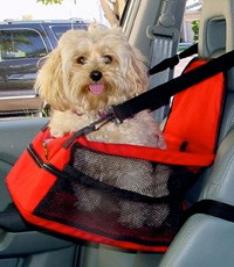 Is a trip to the vet your dog’s idea of a car ride? Broaden your friend's horizons, and lessen his neurosis, with mini-road trips.
Is a trip to the vet your dog’s idea of a car ride? Broaden your friend's horizons, and lessen his neurosis, with mini-road trips.If your dog only travels in the car to go to the vet or other angst ridden locations, start slowly, beginning with short trips to the dog park or to a friend’s house. Once your dog begins to associate the car with pleasant outings, increase the length of the ride.
Try not to feed your dog a few hours before you travel. A full stomach may intensify upset if your pet is prone to motion sickness. If your dog does exhibit signs of motion sickness, such as excessive drooling, park the car and go for a brief stroll.
Never leave your dog in your car unattended. This is especially true during the hot months when temperatures rise rapidly in a closed car. Even opening the window slightly does not allow sufficient air to circulate. Dogs left in hot cars can suffer heat stroke or even death.
Keep a few treats with you for the ride and give your pet a reward. Stopping for lunch at the drive through? Enjoy your meal while your pet enjoys her treat.
For warm days and longer trips, take along water for your dog to drink and a spray bottle filled with water for a quick pooch pick-me-up. Remember to pull over every few hours for a bathroom break and leg stretch.
If your dog insists on sticking his head out the window for the aux natural feel, make certain he is wearing goggles or secure eye protection.
Put your dog on his leash before exiting the car to help avoid quick uncontrolled escapes.
Buckle up. Invest in a dog harness, seat belt restraint, car seat or crate for your dog.
The doggie car booster seat from www.dogclothes-apparel.com is the perfect solution to safely satisfy your pet's natural urge to look out the window. The seat easily attaches to your car's passenger seat and includes an adjustable safety harness for for added protection.